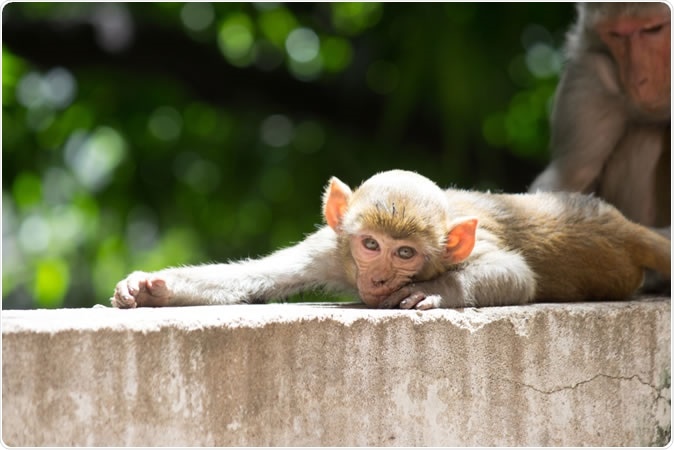A new study in monkeys, published on October 14, 2019, in the Proceedings of the National Academy of Sciences, shows that organisms at the bottom of the social hierarchy live shorter lives. Moreover, they experience more sickness, and may continue to experience health problems despite moving up later. Adverse experiences of social life continue to reflect in their genes much longer than the actual experience, in the form of changes in gene expression via altered gene regulation.
The evidence for this comes from studies that show changes in the peripheral blood cells, which indicate that immune function may undergo dysregulation as a result of low social status. These include higher levels of proinflammatory gene expression, reduced innate immune responses, and differences in the expression of various transcription factors. These in turn were thought to have resulted in increased antibacterial immunity but lowered antiviral defenses, in animals at the bottom of the social ladder. However, the effects of social adversity on genetic expression after exposure to viruses or bacteria are still unclear. The present study aimed to help clarify this aspect.

We never forget our torments. Even our DNA has a molecular memory of being bullied, finds a new study of rhesus monkeys. The Rhesus Macaque Monkey. Image Credit: Robert Ross / Shutterstock
The study
The research was carried out in 45 rhesus macaque monkeys. The scientists observed the typical ‘pecking order’ being established by jostling among the monkeys until each was in her allotted position. As with human societies, the females at the top did as they pleased, hogging as much food and space as they wished, getting others to groom them as often as they wanted, and generally being intolerant of any rebellion. On the other hand, the lowlier females acted submissively, waiting for the higher-ups to leave them their quota once they were satisfied.
The start of the project saw groups of five unrelated monkeys who were all unfamiliar with each other. Each new monkey joined the group singly. In these groups, the earliest arrival was the top monkey, while the most junior was the latest to join. In every case, the newest arrivals were bullied, and preferred to crouch down abjectly and stay out of confrontations, rather than try to move up the ladder.
After one year, the researchers moved the monkeys around, forming new groups, again adding monkeys one by one. Now some of the monkeys who had been on top became junior, displaying submissive behavior. Others who had been the lowest became dominant.
The third step was a blood test to look at the immune function of the monkeys. An earlier 2016 study showed that thousands of immune-related and other genes are switched on or off inside the blood cells depending on the female’s rank in the hierarchy. Thus monkeys at the bottom had some genes constitutively ‘on’, leading to a hypersensitive immune system that responded excessively to even minor bacterial infections.
The findings
The current study looked at how peripheral blood cells performed in three cultures: first, a control culture without any infectious agents, secondly, another culture with lipopolysaccharide (LPS) antigen, a Gram-negative molecule that stimulates immunity, and a third culture with a molecule that simulates viral infection. It confirms that a past history of social dominance or the lack of it was responsible for the level of expression of approximately 3,700, 5,300 and 2,700 genes in each set of cultures, respectively. The highest influence was seen on the genes in the LPS-stimulated culture. The relationship between gene expression intensity and social dominance affected five times as many genes in culture 3 compared to the LPS culture. However, both antiviral and antibacterial signaling was increased in the viral-mimicking culture, which may indicate higher levels of inflammation in individuals of low social status.
The study showed that over 1,000 of these genes continued to be stuck in their former position in previously lowly female monkeys, irrespective of the later promotion in rank. However, those females who shifted downwards in rank showed corresponding changes in gene expression. The researchers suggest that being dominant earlier in life may correspond with an increased capacity to change in response to an altered social environment, and vice versa. Or it may simply be that the effects of social status vanish faster with females who were formerly dominant compared to those who were at the bottom of the heap.
The surprising thing for the researchers was the physical residue of earlier emotional stress, such that the newly dominant females showed the persistent effects of earlier bullying by higher-ranking monkeys. It is possible that epigenetics partly contributes to this, in response to environmental stimulation. However, some immune cells, such as the long-lived memory T cells, persist for long periods, and these may account for over 40% of peripheral T cells in adults. Thus there could be more than one reason for the differential retention of social history effects in different genes.
Implications
The current research indicates that socially troubling experiences can embed themselves in molecular processes, including leaving genetic footprints behind, even in adult life. Researcher Jenny Tung describes this as “baggage”, commenting, “Our results suggest that your body remembers having low social status in the past. And it holds on to that memory much more than it would if things had been really great.”
Journal reference:
Social history and exposure to pathogen signals modulate social status effects on gene regulation in rhesus macaques. Joaquín Sanz, Paul L. Maurizio, Noah Snyder-Mackler, Noah D. Simons, Tawni Voyles, Jordan Kohn, Vasiliki Michopoulos, Mark Wilson, Jenny Tung, and Luis B. Barreiro. Proceedings of the National Academy of Sciences. October 14, 2019, https://www.pnas.org/content/early/2019/10/11/1820846116